some ugly one, which engage the exclusive attention of the critics.
I may, however, state two general principles, closely connected with the results of this chapter, the recognition of which would seem to be of great importance for the investigation of what things are truly beautiful. The first of these is (1) a definition of beauty, of what is meant by saying that a thing is truly beautiful. The naturalistic fallacy has been quite as commonly committed with regard to beauty as with regard to good: its use has introduced as many errors into Aesthetics as into Ethics. It has been even more commonly supposed that the beautiful may be defined as that which produces certain effects upon our feelings; and the conclusion which follows from this—namely, that judgments of taste are merely subjective—that precisely the same thing may, according to circumstances, be both beautiful and not beautiful—has very frequently been drawn. The conclusions of this chapter suggest a definition of beauty, which may partially explain and entirely remove the difficulties which have led to this error. It appears probable that the beautiful should be defined as that of which the admiring contemplation is good in itself. That is to say: To assert that a thing is beautiful is to assert that the cognition of it is an essential element in one of the intrinsically valuable wholes we have been discussing; so that the question, whether it is truly beautiful or not, depends upon the objective question whether the whole in question is or is not truly good, and does not depend upon the question whether it would or would not excite particular feelings in particular persons. This definition has the double recommendation that it accounts both for the apparent connection between goodness and beauty and for the no less apparent difference between these two conceptions. It appears, at first sight, to be a strange coincidence, that there should be two different objective predicates of value, ‘good’ and ‘beautiful,’ which are nevertheless so related to one another that whatever is beautiful is also good. But, if our definition be correct, the strangeness disappears; since it leaves only one unanalysable predicate of value, namely ‘good,’ while ‘beautiful,’ though not identical with, is to be defined by reference to this,
